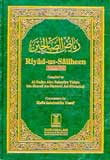Riyad Us-Saliheen (Gardens of the Righteous)

Chapter 99
Excellence of using the right Hand for Performing various good Acts
Allah, the Exalted, says:
"Then as for him who will be given his Record in his right hand will say: `Take, read my Record!''' (69:19)
"So those on the Right Hand (i.e., those who will be given their Records in their right hands) how (fortunate) will those be on the Right Hand! (As a respect for them, because they will enter Jannah). And those on the Left Hand (i.e., those who will be given their Record in their left hands) how (unfortunate) will those be on the Left Hand! (As a disgrace for them, because they will enter Hell).'' (56:8,9)
721. `Aishah (May Allah be pleased with her) reported: Messenger of Allah (PBUH) liked to use his right hand in all matters: in combing his hair and wearing his shoes.
[Al-Bukhari and Muslim].
722. `Aishah (May Allah be pleased with her) reported: Messenger of Allah was used to using his right hand for performing Wudu' and for eating his food whereas he was used to using his left hand in his toilet and for other similar purposes.
[Abu Dawud]
Commentary: Messenger of Allah (PBUH) used to use his left hand in washing his private parts and cleaning his nose and similar things, Muslims are obliged to follow his example.
723. Umm `Atiyyah (May Allah be pleased with her) reported: The Prophet (PBUH) instructed us at the time of washing the dead body of his daughter Zainab (May Allah be pleased with her) to begin with her right side, and from the parts that are washed in Wudu'.
[Al-Bukhari and Muslim].
Commentary: Here we are told about the excellence of washing the dead starting with their right side, Umm `Atiyyah (May Allah be pleased with her) was one of those women who had washed the dead body of the Prophet's daughter Zainab (May Allah be pleased with her). Messenger of Allah (PBUH) directed these women to do as mentioned above. We infer from this Hadith that either women should wash the dead body of a woman or this job should be done by her husband.
724. Abu Hurairah (May Allah be pleased with him) reported: Messenger of Allah (PBUH) said, "When any of you puts on his shoes, he should put on the right one first; and when he takes them off, he should begin with the left. Let the right shoe be the first to be put on and the last to be taken off.''
[Al-Bukhari and Muslim].
Commentary: This Hadith sheds light on the etiquette of wearing as well as removing shoes. Every Muslim is supposed to have regard for the Prophetic example and to follow it.
725. Hafsah (May Allah be pleased with her) reported: Messenger of Allah (PBUH) used to use his right hand for eating, drinking and wearing his clothes and used to use his left hand for other purposes.
[Abu Dawud].
726. Abu Hurairah (May Allah be pleased with him) reported: Messenger of Allah (PBUH) said, "When you wear your clothes or perform your Wudu', begin with your right side.''
[Abu Dawud and At-Tirmidhi].
727. Anas (May Allah be pleased with him) reported: When Messenger of Allah (PBUH) went to Mina, he came to Jamrat-ul-`Aqabah and threw pebbles at it. After that, he went to his lodge in Mina and sacrificed. Then he called for a barber and pointed his right side to him, said, "Shave from here.'' Then he pointed his left side and said, "Take (hair) from here.'' Then he distributed his hair among the people.
[Al-Bukhari and Muslim].
Another narration is: After the Messenger of Allah (PBUH) had thrown pebbles at Jamrah and sacrificed an animal, he turned the right side of his head towards the barber who shaved it for him. Then he called Abu Talhah Ansari (May Allah be pleased with him) and gave his hair to him. Then he turned his head to the left side and asked the barber to shave it. He gave the hair to Abu Talhah and told him, "Distribute it among the people.''
Commentary: After returning from `Arafat on the 10th of Dhul-Hijjah, pilgrims throw pebbles at Jamrat-ul-Aqabah. This is followed by the sacrifice of an animal, the shaving of the head and the farewell Tawaf (circumambulation) of the Holy House. All this is to be observed on the Sacrificial Day in the exact order of priorities. Yet, an unexpected disturbance in this order involves no juristic disadvantage. Moreover, the act of throwing pebbles marks an end to the ban on legal concessions. But this permissibility is minor and partial, that is, everything becomes lawful except the physical contact with one's wife. The ban is totally lifted in the wake of the farewell circumambulation of the House of Allah. Secondly, we are told that the ritual shaving of the head should begin from the right side. Thirdly, there is a mention of the distribution of the Prophet's hair as a blessing among the Companions which is one of the Prophetic characteristics.
